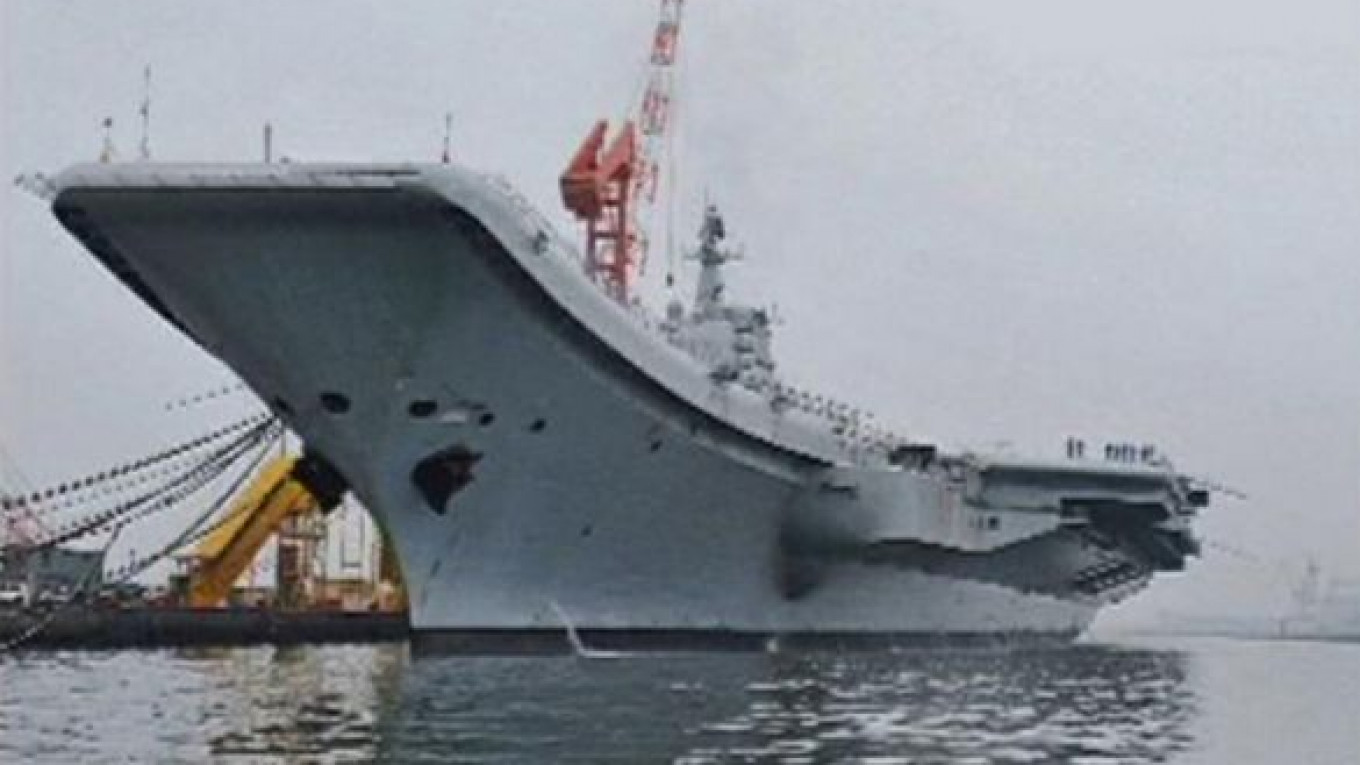BEIJING — China's first aircraft carrier — a refurbished former Soviet vessel — swept through fog-shrouded waters Wednesday to open sea trials that underscore concerns about the country's growing military strength and its increasingly assertive claims over disputed territory.
The mission marks a first step in readying the craft for full deployment. China says the ship is intended for research and training, pointing to longer-term plans to build up to three additional clones of the carrier in China's own shipyards.
"As a major economy, China on the one hand should take more responsibilities for the world and on the other hand, it has some new security interests that it needs to protect. Under the circumstances, China's naval power needs to grow accordingly," said Wang Shaopu, director of the Center for Pan-Pacific Studies at Jiaotong University in Shanghai.
Information about the cruise was tightly restricted in line with the Chinese military's habitual secrecy, although the official Xinhua news agency indicated that the step had been planned for some time. The 300-meter vessel departed through fog from the northern port of Dalian where it is being overhauled.
"After returning from the sea trial, the aircraft carrier will continue refit and test work," Xinhua said.
China has spent the better part of a decade refurbishing the carrier, formerly known as the Varyag, after it was towed from Ukraine in 1998, minus its engines, weaponry and navigation systems.
Beijing's carrier program is seen as the natural outgrowth of the country's burgeoning military expansion, fed by two decades of near-continuous, double-digit percentage increases in the defense budget. China's announced military spending rose to $91.5 billion last year, the second highest in the world after the United States.
While the development of carriers is driven largely by bragging rights and national prestige, China's naval ambitions have been brought into focus with its claims to disputed territory surrounding Taiwan and in the South China Sea.
Taiwan, the self-governing island democracy claimed by China as its own, has responded to the growing Chinese threat by developing missiles capable of striking carriers at sea. A demonstration Wednesday of military technology in the capital Taipei showed a Hsiung Feng III missile hitting a carrier that was a dead ringer for the former Varyag.
Wednesday's exercise was essentially a test of the ship's propulsion system, with preparations to launch and recover aircraft still a long way off, said Andrei Chang, editor of Kanwa Asian Defense magazine. "This was really just for show. They still have a long way to go," Chang said.
Positioning a carrier off its coast would boost the range of China's naval aircraft, increasing their ability to hit U.S. bases in Japan, South Korea and possibly Guam.
Beijing is believed to be developing a carrier version of the Russian Su-33, dubbed the J-15, a step that has angered defense officials in Moscow who accuse China of stealing their defense technology.
Both the European Union and the United States ban weapons sales to China, leaving Russia as its main overseas arms supplier.
With Moscow's defense industry declining in production and innovation, Chinese leaders have taken to marrying old Soviet platforms with cutting-edge Chinese technology. The same approach has been taken with the space program, where a capsule based on the former Soviet Soyuz design has been re-engineered using new technology.
In contrast to China's slew of new frigates, submarines and other warships, the carrier will actually add little to the country's naval capabilities, Western analysts said.
"At best, it could make some waves in the South China Sea and intimidate the poorly equipped navies of Vietnam, Indonesia and the Philippines," said Jonathan Holslag of the Brussels Institute of Contemporary China Studies.
A Message from The Moscow Times:
Dear readers,
We are facing unprecedented challenges. Russia's Prosecutor General's Office has designated The Moscow Times as an "undesirable" organization, criminalizing our work and putting our staff at risk of prosecution. This follows our earlier unjust labeling as a "foreign agent."
These actions are direct attempts to silence independent journalism in Russia. The authorities claim our work "discredits the decisions of the Russian leadership." We see things differently: we strive to provide accurate, unbiased reporting on Russia.
We, the journalists of The Moscow Times, refuse to be silenced. But to continue our work, we need your help.
Your support, no matter how small, makes a world of difference. If you can, please support us monthly starting from just $2. It's quick to set up, and every contribution makes a significant impact.
By supporting The Moscow Times, you're defending open, independent journalism in the face of repression. Thank you for standing with us.
Remind me later.






